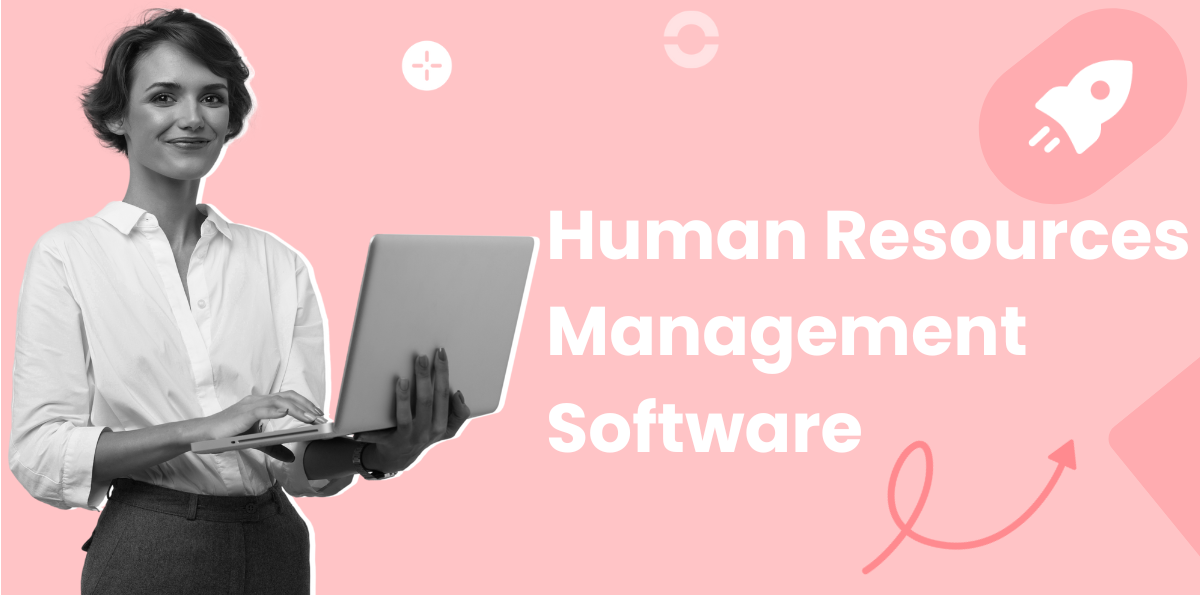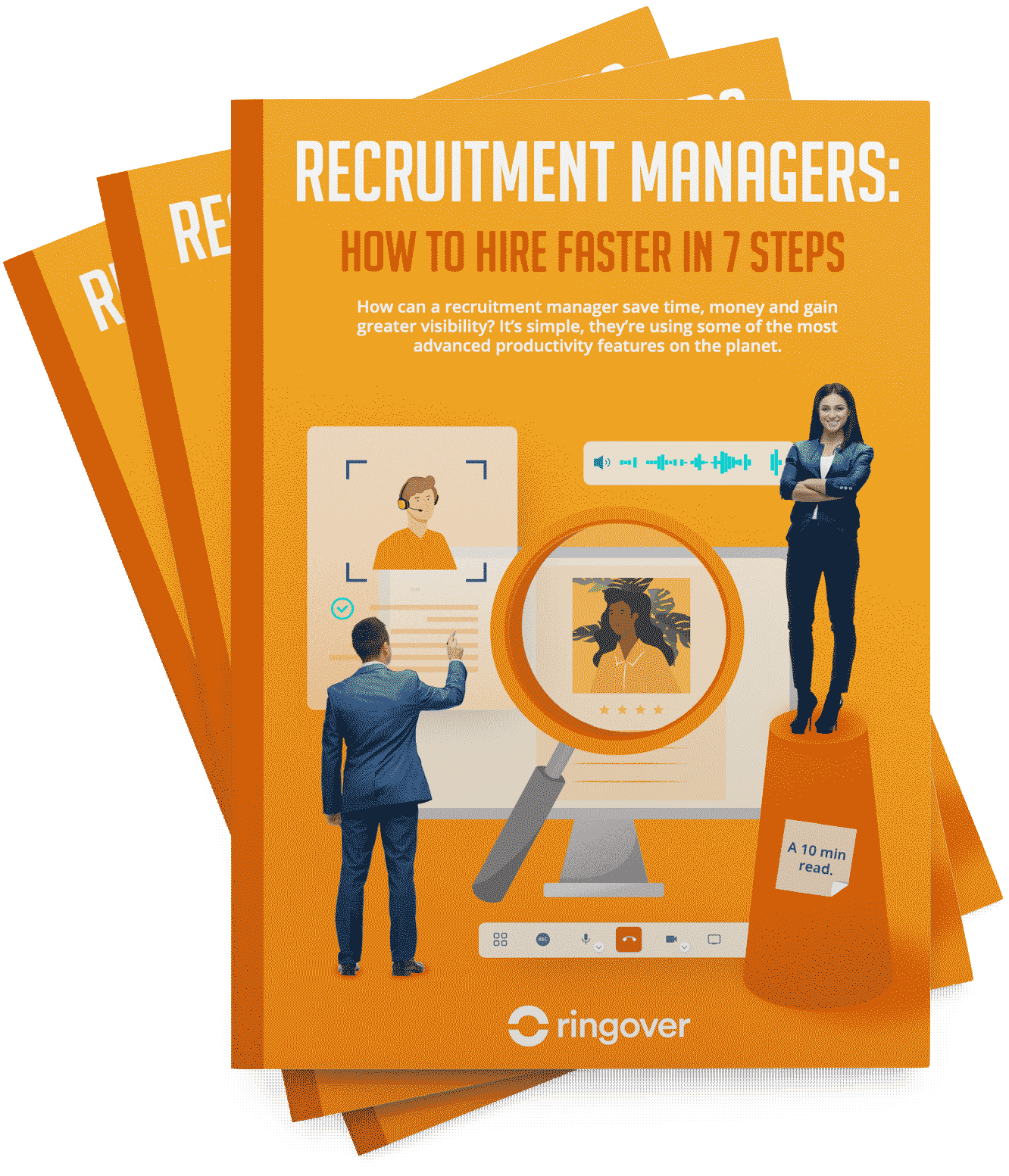Summary
The market is brimming with options, yet selecting the perfect match for your organisation can be daunting. In this comprehensive guide, we're diving into the top 10 human resources management software (HRMS) of 2025, evaluating them based on their features, cost-effectiveness, customer feedback, and much more.
Learn More About Ringover for RecruitingTable: Best 10 Personnel Management Software
| Software | Description | Key Features |
|---|---|---|
| monday.com | A workflow management platform designed to seamlessly manage your employees, projects, and tasks visually and intuitively | Highly customizable and flexibleUser-friendly with collaborative featuresIntegrates with many popular toolsOffers various templates and automations |
| Paycor | A comprehensive cloud-based HR and payroll software aimed at simplifying and optimising your employee management processes | Comprehensive benefits administration and time & attendance trackingAdvanced analytics and reporting toolsEnsures compliance and securityIdeal for larger companies with complex needs |
| BambooHR | An all-encompassing online HR software supporting you through the entire employee lifecycle, from recruitment to retention | Features include applicant tracking, onboarding, payroll, and moreEmployee self-service and engagement toolsPerformance management and feedback supportPrioritises employee satisfaction and culture |
| Workday | A leading cloud-based human capital management (HCM) software for managing a global workforce efficiently | Covers payroll, benefits, talent management, learning, etc.Offers data-driven insights and recommendationsPromotes diversity and inclusionEasily scales with business growth |
| Rippling | A cutting-edge HR and IT software that centralises the management of your employees, devices, and apps | Comprehensive payroll, benefits, onboardingoffboardingEfficient device management and app provisioningTraining and development supportWide app integration |
| Zenefits | A user-friendly cloud-based HR software streamlining employee, benefits, and compliance management | Streamlined payroll, benefits, time & attendanceGoal management and performance reviewsEncourages employee wellness and engagementSuitable for small to medium-sized businesses |
| ClickUp | A versatile productivity platform that centralises the management of your employees, projects, and tasks in a customizable manner | Highly adjustable and adaptableCollaborative with a user-friendly interfaceSeamless integration with popular toolsOffers various views and automations |
| UKG Pro | A comprehensive cloud-based HCM software focusing on employee, payroll, and talent management | Extensive payroll, benefits, time & attendance managementAI-powered functionality and insightsSupports life-work balance and wellnessCatered towards larger and complex organisations |
| ADP Workforce Now | A robust cloud-based HR software designed for managing employees, payroll, and compliance effectively | Inclusive of payroll, benefits, time & attendanceAdvanced analytics and reporting capabilitiesCompliance and security supportGeared towards medium to large businesses |
| Sage HR | An intuitive online HR software facilitating effective employee, performance, and feedback management | Offers time & attendance, payroll, leave management, etc.Equipped with performance management and feedback toolsPromotes employee engagement and recognitionBest suits small to medium-sized businesses |
List: Top 10 human resources management software
1. monday.com
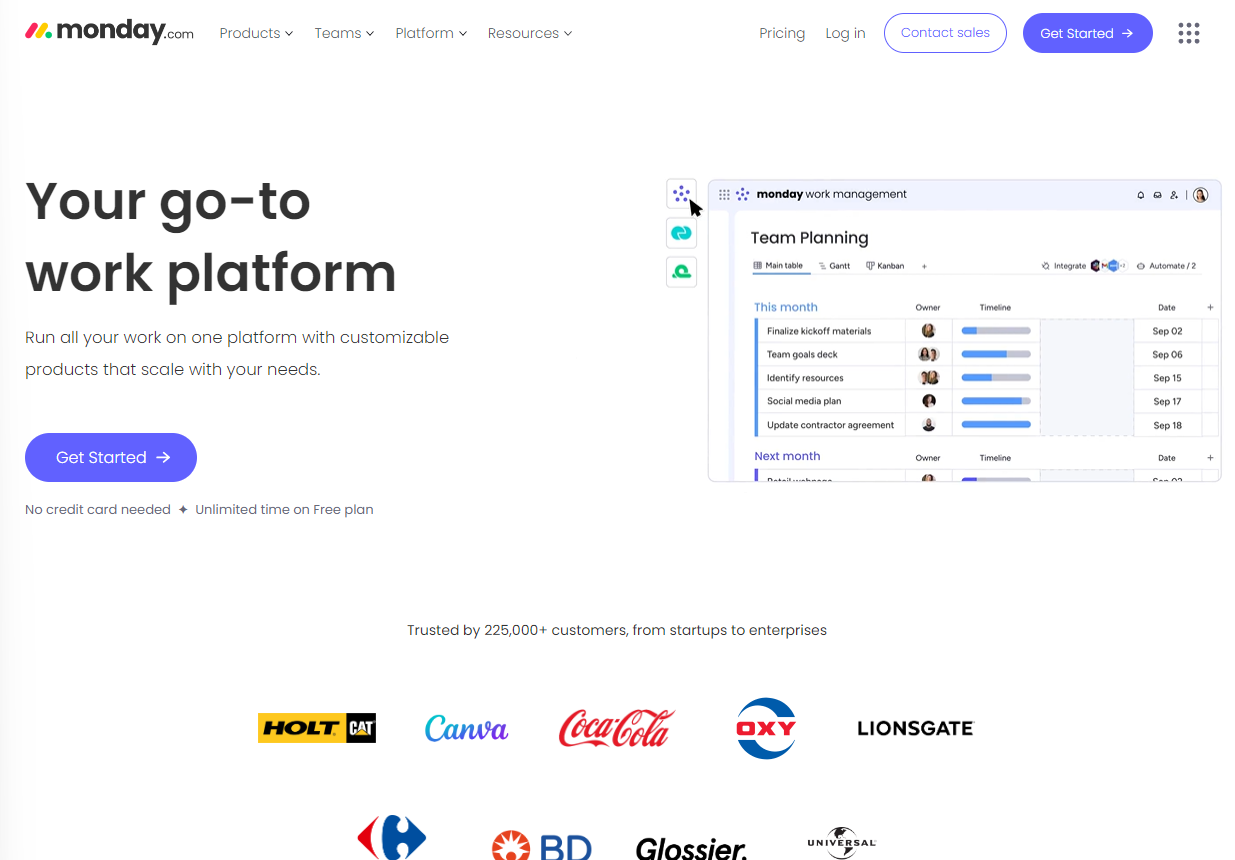
monday.com is a workflow management platform that helps you manage your employees, projects, and tasks in a visual and intuitive way. You can customise and automate your workflows, collaborate with your team, and integrate with many popular tools. monday.com also offers various templates and views to suit different needs and preferences.
This software also has the advantage of integrating with Ringover, a business phone system. Connecting the two solutions via computer telephony integration decreases repetitive data entry and centralises information like the interaction history with personnel. Not to mention, you'll be able to improve the employee experience thanks to tools like CTI screen pop and an easily accessible database of your call recordings.
monday.com Advantages✅
- Adaptable to any type of business or industry.
- Collaborative, with features like chat, comments, mentions, and notifications
2. Paycor

Paycor is a cloud-based HR and payroll software that simplifies and streamlines your employee management processes. You can handle benefits administration, time and attendance, performance management, and more with Paycor. Paycor also provides analytics and reporting tools, as well as compliance and security support.
Paycor Advantages✅
- Benefits administration
- Analytics and reporting tools
- Compliance and security
Paycor Disadvantages❌
- Not very customizable
- Clumsy user experience
- No free trial available
3. BambooHR

BambooHR is an online HR software that helps you manage your employee lifecycle, from hiring to retention. You can use BambooHR to handle applicant tracking, onboarding, payroll, benefits, and more. BambooHR also provides employee self-service and engagement tools, as well as performance management and feedback features.
BambooHR Advantages✅
- Applicant tracking
- Employee self-service and engagement tools
- Focuses on employee satisfaction and culture
BambooHR Disadvantages❌
- Can be pricey, especially for smaller businesses
- Sometimes slow to load large amounts of data or generate reports
- No workforce management or scheduling features
4. Workday

Workday is a cloud-based human capital management (HCM) software that helps you manage your global workforce. You can use Workday to handle payroll, benefits, talent management, learning, and more. Workday also provides data-driven insights and recommendations, as well as diversity and inclusion support.
Workday Advantages✅
- Payroll and benefits for over 140 countries
- Provides data-driven insights and recommendations
- Supports diversity and inclusion
Workday Disadvantages❌
- Complex, generally best for large businesses
- Costly
- No free trial or a demo
5. Rippling
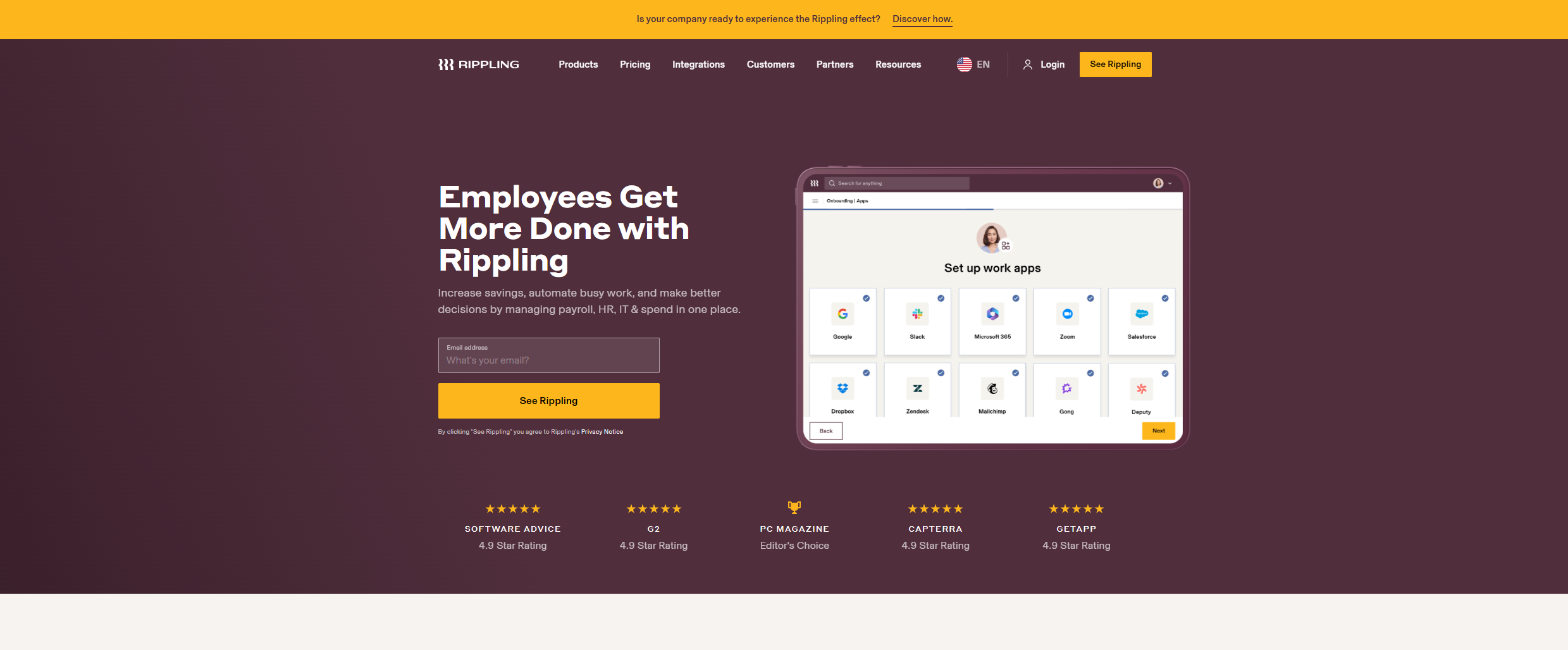
Rippling is a modern HR and IT software that helps you manage your employees, devices, and apps in one place. You can use Rippling to handle payroll, benefits, onboarding, offboarding, and more. Rippling also provides device management and app provisioning, as well as training and development features.
Rippling Advantages✅
- Device management and app provisioning
- Training and development features
- Integrates with hundreds of apps, such as Zendesk
Rippling Disadvantages❌
- Buggy, especially when syncing with other apps or platforms
- Confusing when setting up or customising the software
- No performance management or feedback features
6. Zenefits
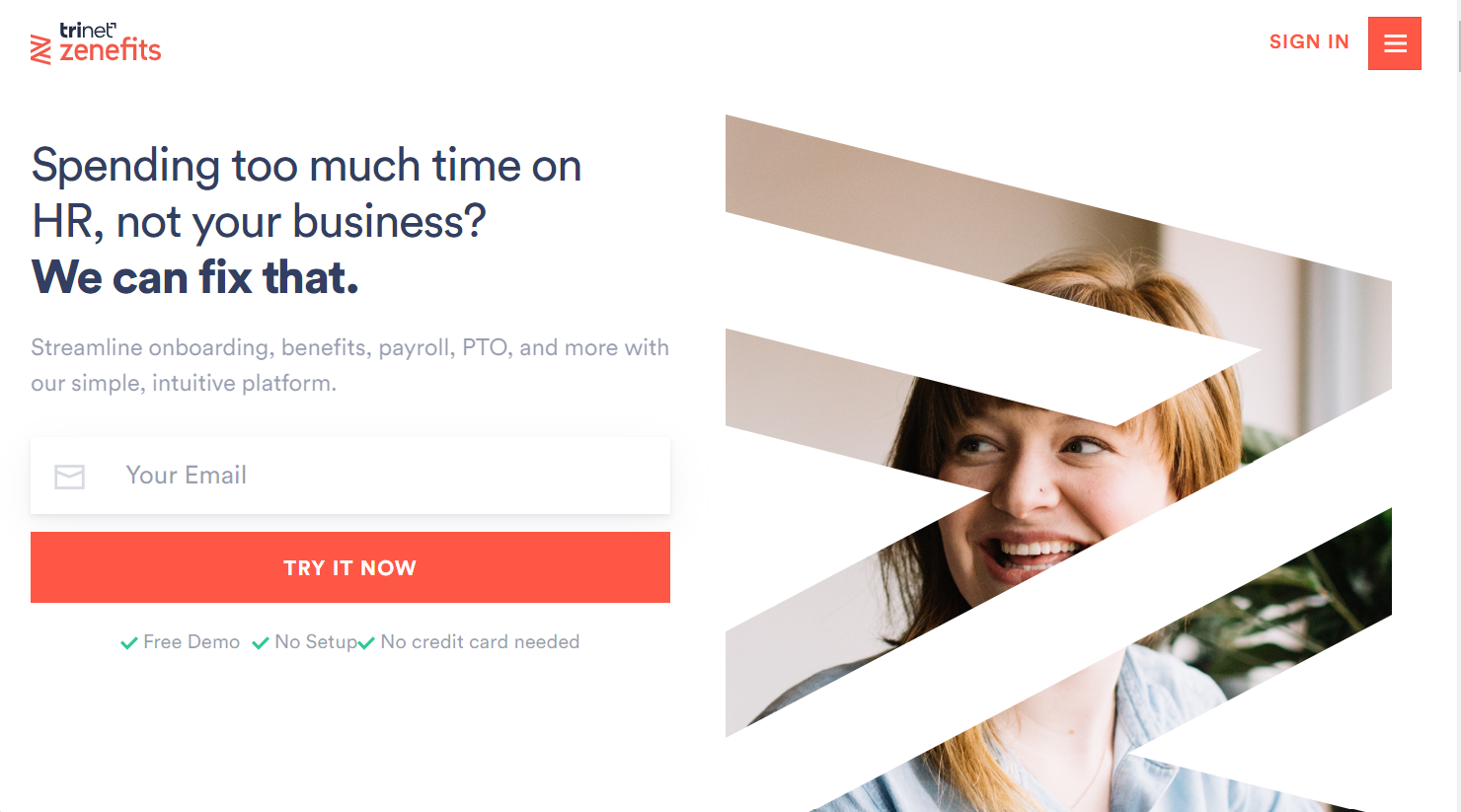
Zenefits is a cloud-based HR software that helps you manage your employees, benefits, and compliance. You can use Zenefits to handle payroll, benefits, time and attendance, and more. Zenefits also provides goal management and performance reviews, as well as employee wellness and engagement features.
Zenefits Advantages✅
- Benefits administration
- Goal management and performance reviews
- Supports employee wellness and engagement
Zenefits Disadvantages❌
- Unreliable at times, especially when processing payroll or generating reports
- Limited customization and integrations
- Lacks applicant tracking or onboarding features
7. ClickUp
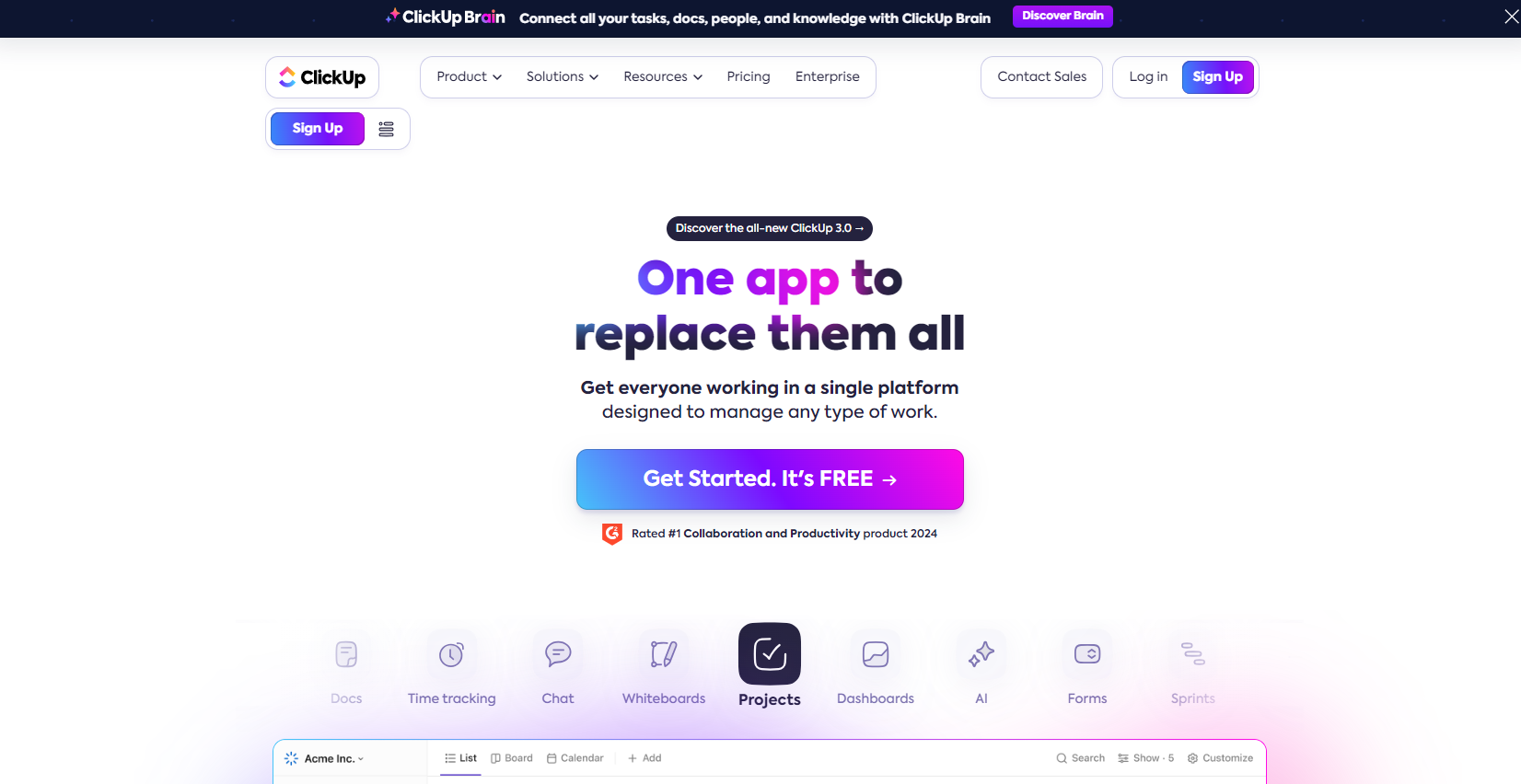
ClickUp is a productivity platform that helps you manage your employees, projects, and tasks in a unified and customizable way. You can use ClickUp to create and assign tasks, collaborate with your team, and integrate with many popular tools. ClickUp also offers various views and automations to suit different needs and preferences.
ClickUP Advantages✅
- Highly customizable and adaptable to any type of business or industry
- User-friendly and collaborative
- Has various views and automations, such as list, board, calendar, gantt
ClickUp Disadvantages❌
- Potentially overwhelming
- Slow, especially when switching between views
- No payroll, benefits, or compliance features
UKG Pro

UKG Pro is a cloud-based HCM software that helps you manage your employees, payroll, and talent. You can use UKG Pro to handle payroll, benefits, time and attendance, and more. UKG Pro also provides AI-powered functionality and insights, as well as life-work management and wellness features.
UKG Pro Advantages✅
- AI-powered functionality and insights
- Life-work management and wellness features
UKG Pro Disadvantages❌
- Can be costly, especially those with more modules
- No free trial or a demo
ADP Workforce Now
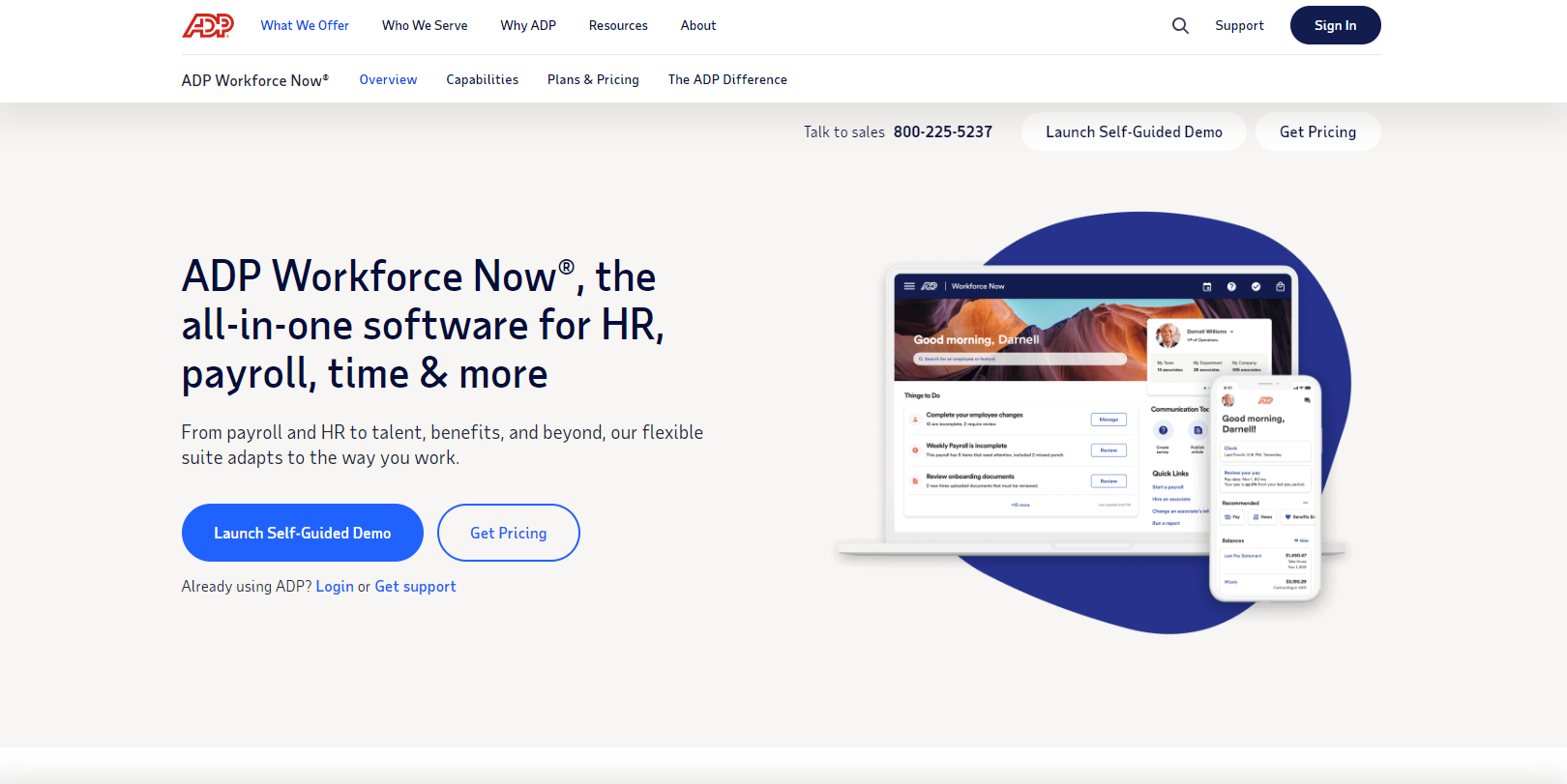
ADP Workforce Now is a cloud-based HR software that helps you manage your employees, payroll, and compliance. You can use ADP Workforce Now to handle payroll, benefits, time and attendance, and more. ADP Workforce Now also provides analytics and reporting tools, as well as compliance and security support.
ADP Workforce Now Advantages✅
- Analytics and reporting options
- Supports compliance and security
ADP Workforce Now Disadvantages❌
- Difficult to set up and use
- No performance management or feedback features
Sage HR
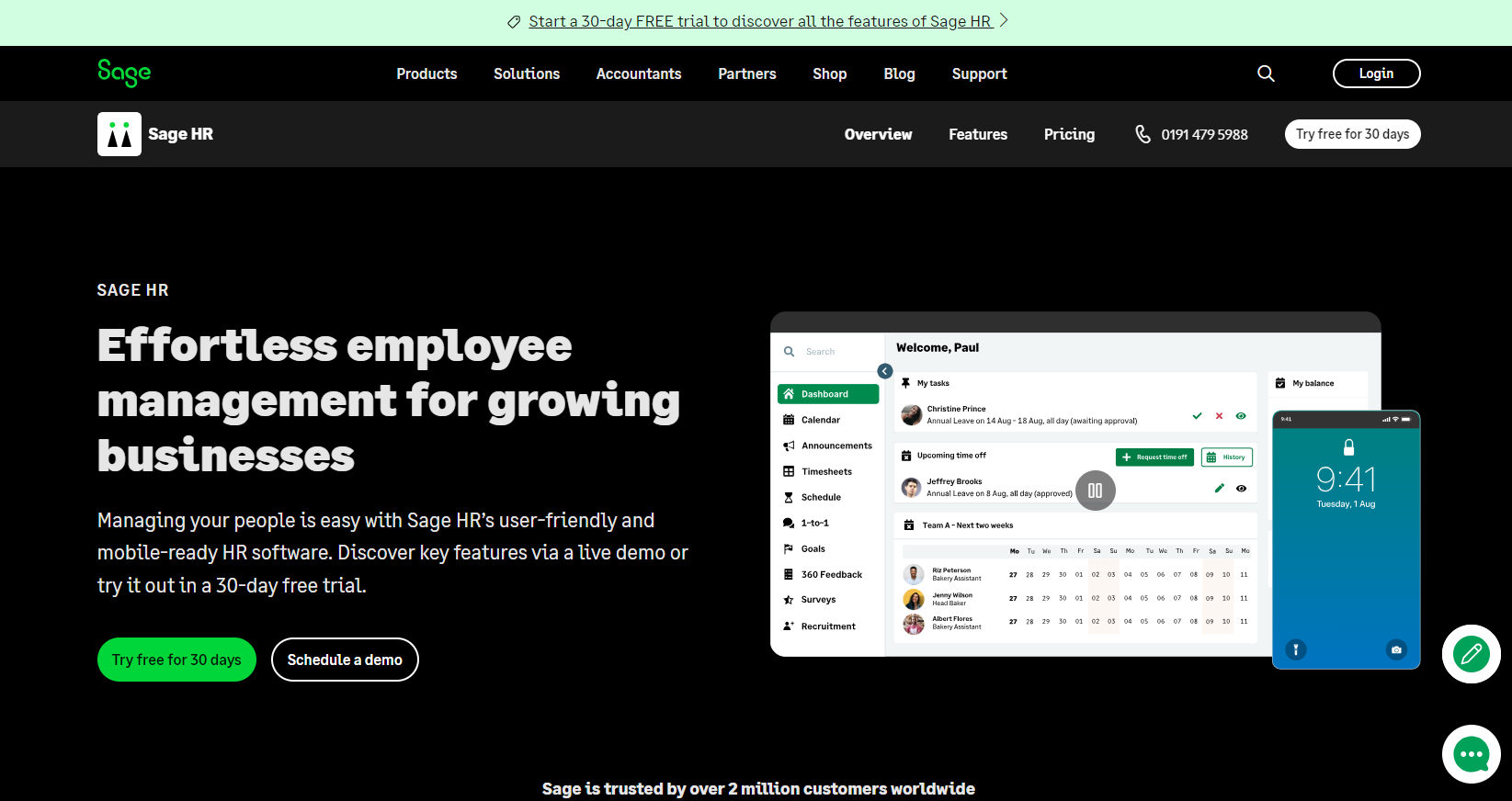
Sage HR is an online HR software that helps you manage your employees, performance, and feedback. You can use Sage HR to handle time and attendance, payroll, leave management, and more. Sage HR also provides performance management and feedback tools, as well as employee engagement and recognition features.
Sage HR Advantages✅
- Tools to track and improve employees' performance and productivity
- Employee engagement and recognition features
- Focuses on small to medium-sized businesses
Sage HR Disadvantages❌
- Buggy when syncing with other apps or platforms
- Limited integration options
- No applicant tracking or onboarding features
What is personnel management software?
Personnel management software, also known as human resources management software, employee management software, or human capital management software, is a powerful tool designed to streamline the diverse facets of human resources. This software covers a broad spectrum of HR functions, including but not limited to employee data management, payroll, benefits administration, performance monitoring, and attendance tracking. Its primary aim is to automate the routine and repetitive tasks traditionally handled manually, thus freeing up time, reducing costs, and optimising resource allocation.
By integrating personnel management software into your HR processes, you gain access to valuable tools and insights that bolster HR strategy and performance. This, in turn, enhances employee satisfaction and retention, contributing to a more harmonious workplace environment.
It's important to note that while the terms personnel management software, human resources management software, employee management software, and human capital management software are frequently used interchangeably, subtle distinctions exist based on their offered features and functionalities. Certain software products might be more focused on payroll and benefits, others on talent management and learning development, and some may even extend to include device management, app provisioning, or bolstered internal communications.
When it comes to selection, personnel management software options vary widely in pricing, customization capabilities, integration ease, user-friendliness, and scalability. Selecting the right software necessitates a careful analysis of your business's specific needs and budget constraints.
Benefits & key features of human resources management software
Incorporating HRMS into your operations can significantly enhance HR processes, boost employee engagement, elevate data accuracy and security, bolster data-driven decision-making, ensure regulatory compliance, and deliver scalability and flexibility. Below, explore the detailed benefits of deploying HRMS:
- Improve your HR processes: HRMS streamlines and automates many routine tasks traditionally performed manually, including payroll, benefits administration, time and attendance tracking, and more. This not only conserves time, money, and resources but also minimises errors and delays. Furthermore, HRMS facilitates task creation and assignment, team collaboration, and integration with various tools and platforms.
- Enhance your employee engagement: HRMS can significantly improve the employee experience and satisfaction, fostering greater retention and loyalty. It provides self-service and engagement tools like chat features, commenting capabilities, mentions, notifications, feedback mechanisms, recognition systems, and more. Additionally, HRMS supports tracking and boosting employee performance and productivity, as well as promoting employee wellness and happiness.
- Increase your data accuracy and security: With personnel management software, accurately collecting and maintaining up-to-date employee data, including personal details, payroll, benefits, performance reports, and attendance records becomes seamless. It ensures data protection against unauthorised access, loss, or theft through encryption, and backup and recovery options. HRMS also enables the generation and exportation of reports and analytics, offering data-driven insights and recommendations.
- Support your data-driven decision-making: HRMS enhances decision-making processes by leveraging data and analytics, allowing for a better and quicker resolution for your business and employees. It aids in measuring and monitoring HR metrics and Key Performance Indicators (KPIs), such as turnover, retention, engagement, and productivity. Moreover, HRMS assists in identifying and tackling HR challenges, trends, and best practices.
- Ensure your compliance: HRMS ensures adherence to federal and state health, safety, and labour regulations, as well as industry standards. It aids in managing compliance documentation, including contracts, policies, and forms, and helps avoid legal issues and penalties through compliance alerts, reminders, and audits.
- Provide scalability and flexibility: As your business evolves, HRMS adapts and expands your HR capabilities. It allows you to adjust HR features and functions, as well as HR costs and resources, according to your needs and budget. HRMS offers customization and integration options so you can build a powerful tech stack that supports optimal performance.
Personnel Management Software FAQ
Which software is best for human resource management?
Identifying the top human resource management software depends on various factors, including specific organisational needs, preferences, and financial considerations. From our research and analysis, leading human resource management software for 2025 include options like Rippling, Paycor, BambooHR, Workday, and again Rippling.
What is HCM software?
HCM software, standing for human capital management software, serves as a tool to manage and enhance the value of your workforce. Covering extensive HR functionalities and compensation among other pivotal areas, HCM software views the workforce as a pivotal business asset, the value of which can be amplified through strategic management and investment.
What is WFM software?
WFM software, or workforce management software, is designed to streamline and automate the management of your labour force to optimise productivity and cost-effectiveness. This encompasses comprehensive workforce-related tasks including time and attendance, scheduling, managing absences, and bolstering employee safety. WFM software facilitates a structured approach to managing a productive workforce efficiently.
Published on September 23, 2024.
